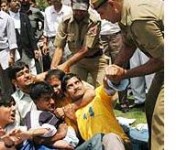Caste matters

A recent headline on the front page of the Times of
The report continued on Page 7, with three tables. One showed subject-wise qualifying scores; the second showed rank-holders (1, 501, 1001…) and their scores; and the third showed subject-wise scores of the first and last candidate in each category. The contents of the tables were a surprise. While the headline on Page One had reflected the poor performance of SC/ST candidates, the table inside revealed two things:
One, the total marks scored by the SC and ST toppers placed them in the first 500 among the General category (their actual ranks were all-India 220 and 281 respectively), a ranking that most IIT aspirants would love to have;
Two, the last candidates of both the SC and ST categories had scored 10 and nine marks more in Maths respectively than the last candidate of the General category (their scores in Physics and Chemistry however, were much lower than those of the last General category student).
Yet, guess what the headline of this inside report was? ``IIT cut-off: Gen students have it tough.¿¿ Said the report in its opening paragraph: ``The cut-offs for SC/ST students to join IITs may be nose diving, for general category students, though, little has changed…¿¿
Any newsperson knows that negative news is news. Hence a headline such as ``IIT cut-off falls to 18 % for SC/ST students¿¿ would probably draw more attention than ``Lowest SC/ST IIT candidates score more than General Category in Maths.¿¿ However, given the general belief among readers of English newspapers that reserved category students are duffers, while general category aspirants have inborn merit, such a headline might actually have drawn more readers. Indeed, even while retaining the original ``IIT cut-off falls to 18 % for SC/ST students¿¿, a shoulder/intro could have been put in: ``But SC/ST toppers make it to all-India top 500.¿¿
These achievements of the SC/ST aspirants qualify as news by any standards. In addition, highlighting them would have broken the stereotype of the ``mediocre¿¿ SC/ST IIT aspirant. Journalists may not think it their responsibility to break stereotypes that stigmatize an entire community; but by the way they structure their reports, by their use of words and headlines, they manage to perpetuate these stereotypes far too well.
Look at the way Charu Sudan Kasturi reported the same news in The Telegraph. Headlined `OBCs bust quality myth¿, the report started thus: ``Two of every three OBC students selected to the IITs this year would have made it without any quotas, 2009 entrance test details reveal, debunking fears that this year¿s quota hike would lead to a drop in student quality. ¿¿
The Times¿ recent report isn¿t unusual; the paper has been consistently running down the performance of reserved category IIT aspirants and students. When Arjun Singh announced OBC reservations in IITs in 2006, the Times, like most other English newspapers, opposed them with gusto. The last two years have shown that OBC students do almost as well as General Category students, often outsmarting them. (This year, the OBC topper was All India rank 3; he even scored four marks more in chemistry than the General Category (and All India) topper.) But the Times has not thought it fit to highlight this. (Of course, this can also be an argument against OBC reservations in IIT.)
Nor has the paper thought it fit to substantiate its assumptions by doing any kind of interview with SC/ST IIT students. Such an interview would make a newsworthy feature any time. Yet, when the agitation against Arjun Singh¿s proposed reservations broke out in 2006, its leaders continuously got front page space.
Ever since the Mandal agitation in 1990, the English press has shown where it stands on reservations. From the articles of Arun Shourie, then editor of the Indian Express, which instigated students to protest against Mandal, to the articles now, which suggest the unworthiness of SC/ST students, not much has changed. In fact, things seem to have got worse. Last year, an article in the Delhi edition of the Times on middle class citizens who wanted to make a difference in politics had this intro: `Tired of crime, corruption and reservation, groups of middle class citizens are coming together to change the political system¿¿. (
Two days after the recent front-page piece on IIT cut-offs, the Mumbai edition of the Times had this gem of a headline: ``Sweeper¿s son steals the show.¿¿ (Page 20), about a young football player who had surprised his team by his performance. This headline could have invited action under the SC/ST Atrocities Act.
And then there was the item in the paper¿s popular column `City Lights¿, which spoke of a tour round a slum where ``water pipes snaked through gutters filled with sewage¿¿. The item then spoke of how, at the end of the tour, the reporters were invited to the home of the resident who had shown them around. Expectedly, he offered them water and tea. ``After seeing water pipes mingling with the sludge, we couldn¿t get ourselves to accept it even though Pawar insisted the water wasn¿t from the area. We feebly excused ourselves saying we weren¿t thirsty, cringing at the hurt in Pawar¿s eyes.¿¿